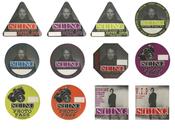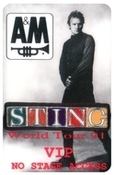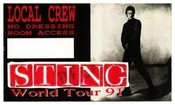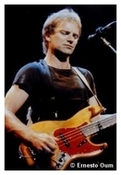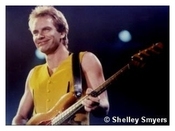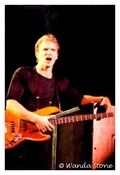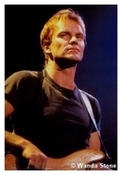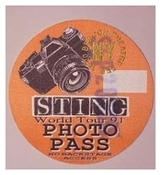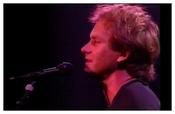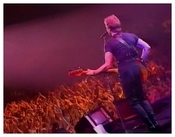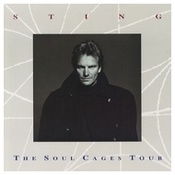
Soul Cages
Mar
12
1991
Toronto, ON, CA
The Skydomewith Concrete Blonde, Vinx
Sting soars at SkyDome Singer rocks, bares his soul for 17,000 fans...
Sting turned in a performance stunning in its sincerity Tuesday night, playing solely for himself and his audience and leaving his sour political messages behind.
The crusader for such causes as Amnesty International and saving the Amazon rain forests didn't utter or sing a guilt-laden word.
Instead, he injected the 90-minute concert with personal anecdotes and casual humor.
''Nice intimate little place,'' he said to 17,000 fans in the cavernous SkyDome stadium.
''We're like one big happy family in a giant living room.''
Sting alternated from pumped-up performer to storyteller during the rapid-pace set of 16 songs, guiding the audience with him.
The concert opened with four songs from his new album, 'The Soul Cages'.
Before the mystical and melodic 'Mad About You', Sting explained it was inspired by the Bible's King David, who fell in love with a general's wife.
Following the truly groovy 'Jeremiah Blues', he dedicated the diaphanous 'Why Should I Cry For You' to his father and purged his soul, sotto voce.
'The Soul Cages', Sting's first album in three years, came about after the death of both his parents over a six-month period in 1987.
Much of it deals with his unfulfilled relationship with his father. Sting's satiny voice was filled with questions as he sang: ''And what would it mean to say that I loved you in my fashion? Why should I cry?''
With the emotion out of the way, the former primary school teacher jump-started the crowd with the classic 'Roxanne', the first hit for his alma mater The Police.
The crowd was on its feet with the pulsating intro chords and sang along through 'King of Pain', 'Message in a Bottle' and 'Walking on the Moon'.
Dressed in black, his short hair tousled and unstyled, Sting, 39, looked like a schoolboy as he grinned when the crowd screamed their requests.
His fascination with jazz was also given its due.
Keyboardist Kenny Kirkland's hands blurred across the jumbo video screen above the spartan stage as he crashed out jazz licks which occasionally upstaged the headliner.
Los Angeles trio Concrete Blonde opened for Sting. The band's Bloodletting album spent much of last year on the charts.
Lead singer Johnette Napolitano's androgenous voice was at once seductive and forlorn.
The band delivered gothic hard rock in 'Bloodletting (The Vampire Song)' and liquid ballads such as 'Joey' and 'Tomorrow, Wendy', a response to the suicide of a friend who contracted AIDS.
(c) Kitchener-Waterloo Record by Wendy Cox
Sting Rocks the Dome: Ex-Policeman thrills 17,000...
''This is an intimate little place , isn't it?'' Sting quipped after his opening number last night in front of 17,000 adoring fans at the Skydome.
Well, not quite, but the 39 year-old ex-Police front man did his best to make it seems that way.
That included the shameless showbiz manoeuvre of saying hello to ''those folks way in the back''.
That friendly overture helped balance a show that was heavy on relatively unfamiliar material from Sting's latest album 'The Soul Cages'.
In fact, by stacking four songs from that LP right at the beginning of the show, Sting seemed to be challenging the audience to stay with him. Surprisingly, they did.
It helped that one of those songs was a hit single, 'All This Time'. It also helped that Sting finally dropped his occasionally smug stage demeanour for 'Why Should I Cry For You?', which he dedicated to his later father. It was a powerful and emotional performance that broke through the emotional barrier that separates singer and audience.
As for Sting's much-touted backing band, they were a mixed blessing. Guitarist Dominic Miller and especially keyboardist David Sancious - best known for his early stint with Bruce Springsteen's E Street Band - were both sensational on a jazzy version of the Police's 'When The World Is Running Down'. But other numbers - a cover of Bill Wither's 'Ain't No Sunshine', for example - just weren't suited to extended soloing.
It made you wish they'd let loose a little more, while also picking their spots a little better.
Still, once Sting coyly called out for requests and got the anticipated response, 'Roxanne', there was no stopping him.
The surprise of the evening was a Sting discovery, Vinx. (''Just the one name, eh? Sting recounted of his first meeting with the drummer/vocalist.) Armed with nothing but a pair of drums strapped over his shoulders, Vinx played three cuts from his upcoming debut album, 'In My Fatha's House', and won over much of the crowd in the process.
The combination of Vinx's free floating vocals over the subtle tones of the drums made for a sound that was both exotic and familiar.
(c) The Toronto Sun by John Sakamoto
Sting the Pop Pin-Up vs. Sting the Striver...
Say this about Sting, the former Police bassist who brought his latest tour to SkyDome last night.
He may sometimes come off as pompous and something of a dilettante do-gooder but after all that, he still makes a hell of a pop star.
Blond and handsome, he looks enough the part of pop pin-up to make you overlook his arrogance or at least accept it as part of the deal. And the fact that he has the talent to back it up certainly makes it easier to accept. His best work, both with the Police and as a solo, featured simple, graceful melodic lines, a rhythmic adventurousness and lyrics that combine crisp irony and an em- bracing humanism.
Sting, however, has never been content to be merely a pop star. He has always seemed to want more - respect as an artist and musician, the company of jazz guys, the works.
Nothing wrong with that. Being a pop star is a pretty silly job. And Branford Marsalis and Kenny Kirkland, both of whom played with Sting on his last tour, were heady enough talents to produce some sparks from Sting's pop-jazz hybrid.
Where Der Stingle ran into trouble last night was when he tried to find the middle ground between his calling as a pop star and his aspirations to something ''higher''.
The Sting that graced the stage was more populist than any version we've seen recently; chatting amiably with the crowd between songs, he opened the show with a smattering of new material from 'The Soul Cages' and then called out for requests. And they came in 'Roxanne', 'Message In A Bottle', the hits of yore.
Unfortunately, while Sting the Populist was at the mike between songs, it was Sting the virtuouso who played the songs. Stretching them out with jazzoid solos from guitarist Dominic Miller, keyboardist David Sancious and of course, his bad self.
The results were by no means unpleasant - these guys are pros - but most lacked the raw energy of Sting's shows as a (mere) pop star and the musical adventurousness that marked his tour with the band built around Marsalis and Kirkland, both players who could challenge Sting on his own stage.
It was a safe entertainment, a crowd pleaser (although the version of 'Purple Haze' bordered on pandering) that contained some lovely moments. Most notably the encore of 'Fragile'. Unfortunately, we've seen better shows from both Sting the Pop Star and Sting the Musical Striver in the past.
(c) The Toronto Star by Chris Dafoe
Sting soars at SkyDome...
Sting turned in a performance stunning in its sincerity Tuesday night, playing solely for himself and his audience and leaving his sour political messages behind.
The crusader for such causes as Amnesty International and saving the Amazon rain forests didn't utter or sing a guilt-laden word.
Instead, he injected the 90-minute concert with personal anecdotes and casual humor. ''Nice intimate little place,'' he said to 17,000 fans in the cavernous SkyDome stadium. ''We're like one big happy family in a giant living room.''
Sting alternated from pumped-up performer to storyteller during the rapid-pace set of 16 songs, guiding the audience with him.
The concert opened with four songs from his new album, 'The Soul Cages'.
Before the mystical and melodic 'Mad About You', Sting explained it was inspired by the Bible's King David, who fell in love with a general's wife.
Following the truly groovy 'Jeremiah Blues', he dedicated the diaphanous 'Why Should I Cry For You' to his father and purged his soul, sotto voce.
'The Soul Cages', Sting's first album in three years, came about after the death of both his parents over a six-month period in 1987.
Much of it deals with his unfulfilled relationship with his father. Sting's satiny voice was filled with questions as he sang: And what would it mean to say that I loved you in my fashion? Why should I cry?
With the emotion out of the way, the former primary school teacher jump-started the crowd with the classic 'Roxanne', the first hit for his alma mater The Police.
The crowd was on its feet with the pulsating intro chords and sang along through 'King of Pain', 'Message in a Bottle' and 'Walking on the Moon'.
Dressed in black, his short hair tousled and unstyled, Sting, 39, looked like a schoolboy as he grinned when the crowd screamed their requests.
His fascination with jazz was also given its due.
Keyboardist Kenny Kirkland's hands blurred across the jumbo video screen above the spartan stage as he crashed out jazz licks which occasionally upstaged the headliner.
Los Angeles trio Concrete Blonde opened for Sting. The band's 'Bloodletting' album spent much of last year on the charts.
Lead singer Johnette Napolitano's androgenous voice was at once seductive and forlorn. The band delivered gothic hard rock in 'Bloodletting' (The Vampire Song) and liquid ballads such as 'Joey' and 'Tomorrow, Wendy', a response to the suicide of a friend who contracted AIDS.
(c) The Record by Wendy Cox
Sting transforms the Dome into a cosy little home...
Gazing at the expanse, of SkySeats surrounding him, and at the SkyCurtain that dwarfed the stage on all sides of him, and the SkyTent that fluttered above him, Sting let out an audible sigh early on in his appearance at The SkyDome Tuesday night.
''It's an intimate little place this, innit?'' he smirked derisively, ''I'll have to do something about it... make contact, somehow.''
For the veteran British rocker and neophyte environmental activist, making contact became Job One on this particular evening. And it is to his credit that he and his three-piece band managed to do just that.
Performing from a small, unassuming stage that seemed absolutely lost against its background, Sting and company turned the event into something as intimate as a high school sock-hop. This was a down-to-earth musical adventure, performed by what seemed to be real flesh-and-blood people, not video cartoons come to life.Long before he became a Policeman, Sting (Gordon Sumner) took a turn at teaching, and it seems the lessons he learned in communication have stayed with him even today.
Thus, before launching into 'Mad About You' from the current 'Soul Cages' album, he told the story of how King David sent one of his generals off to war specifically so he could pursue that soldier's wife. This humorous aside had the audience leaning forward; listening intently. And before launching into 'Why Should I Cry For You?', which was written as a testament to his father, Sting shared the only piece of advice his father had given him - don't get married, go to sea.
Another way in which Sting connected with this intimate gathering of 17,000 was to ask for requests. From amid the general hubbub, he gleaned demands for such obvious old Police standards as 'Roxanne', 'Message In A Bottle' and 'King Of Pain', all of which were included here. But instead of a perfunctory run-through, the numbers were given supercharged new treatments.
Keyboards player David Sancious was brilliant, bringing a traditional jazz edge (evoking Errol Garner one moment, Chick Corea the next, and having them make sense in the context of these songs into the mix. Sting's segment took three distinct routes.
Material from 'Soul Cages' represented his solo career (although his other solo albums were given surprisingly short shrift), while a handful of favourites represented the Police years. Some unexpected covers (a raunchy 'Purple Haze', a soulful Van Morrison-like rendition of Bill Withers's 'Ain't No Sunshine') were sprinkled in to round things out.
Despite admitting to his 'perennial' cold, Sting was in fine voice, his band flew, and the bond between performer and audience was cemented.
Ironically, opening act Concrete Blonde was less successful. Having, only recently graduated from the club scene to larger venues; the trio might have been expected to re-create an intimate rock-club atmosphere. But singer/bassist Johnette Napolitano and company seemed dwarfed by the stage and were let down by inadequate lighting that seemed to diminish them even more. Also, by sticking their best known song (Joey) early in the set, they simply had nowhere to go afterward. Hard to believe this was the same band that so overwhelmed and captivated the audience at The Diamond in Toronto late last year.
In between Concrete Blonde and Sting appeared a performer named Vinx, apparently a protege, of Sting.
Vinx sang and played African drums; sort of a Bobby McFerrin-meets-Mongo Santamaria hybrid. And while his music was interesting (although predictably thin), his asides between songs (''I'm dreaming of a white... girlfriend '') indicated that he has more promise as a raunchy comedian than a musician.
(c) The Globe by Alan Niester
Sting turned in a performance stunning in its sincerity Tuesday night, playing solely for himself and his audience and leaving his sour political messages behind.
The crusader for such causes as Amnesty International and saving the Amazon rain forests didn't utter or sing a guilt-laden word.
Instead, he injected the 90-minute concert with personal anecdotes and casual humor.
''Nice intimate little place,'' he said to 17,000 fans in the cavernous SkyDome stadium.
''We're like one big happy family in a giant living room.''
Sting alternated from pumped-up performer to storyteller during the rapid-pace set of 16 songs, guiding the audience with him.
The concert opened with four songs from his new album, 'The Soul Cages'.
Before the mystical and melodic 'Mad About You', Sting explained it was inspired by the Bible's King David, who fell in love with a general's wife.
Following the truly groovy 'Jeremiah Blues', he dedicated the diaphanous 'Why Should I Cry For You' to his father and purged his soul, sotto voce.
'The Soul Cages', Sting's first album in three years, came about after the death of both his parents over a six-month period in 1987.
Much of it deals with his unfulfilled relationship with his father. Sting's satiny voice was filled with questions as he sang: ''And what would it mean to say that I loved you in my fashion? Why should I cry?''
With the emotion out of the way, the former primary school teacher jump-started the crowd with the classic 'Roxanne', the first hit for his alma mater The Police.
The crowd was on its feet with the pulsating intro chords and sang along through 'King of Pain', 'Message in a Bottle' and 'Walking on the Moon'.
Dressed in black, his short hair tousled and unstyled, Sting, 39, looked like a schoolboy as he grinned when the crowd screamed their requests.
His fascination with jazz was also given its due.
Keyboardist Kenny Kirkland's hands blurred across the jumbo video screen above the spartan stage as he crashed out jazz licks which occasionally upstaged the headliner.
Los Angeles trio Concrete Blonde opened for Sting. The band's Bloodletting album spent much of last year on the charts.
Lead singer Johnette Napolitano's androgenous voice was at once seductive and forlorn.
The band delivered gothic hard rock in 'Bloodletting (The Vampire Song)' and liquid ballads such as 'Joey' and 'Tomorrow, Wendy', a response to the suicide of a friend who contracted AIDS.
(c) Kitchener-Waterloo Record by Wendy Cox
Sting Rocks the Dome: Ex-Policeman thrills 17,000...
''This is an intimate little place , isn't it?'' Sting quipped after his opening number last night in front of 17,000 adoring fans at the Skydome.
Well, not quite, but the 39 year-old ex-Police front man did his best to make it seems that way.
That included the shameless showbiz manoeuvre of saying hello to ''those folks way in the back''.
That friendly overture helped balance a show that was heavy on relatively unfamiliar material from Sting's latest album 'The Soul Cages'.
In fact, by stacking four songs from that LP right at the beginning of the show, Sting seemed to be challenging the audience to stay with him. Surprisingly, they did.
It helped that one of those songs was a hit single, 'All This Time'. It also helped that Sting finally dropped his occasionally smug stage demeanour for 'Why Should I Cry For You?', which he dedicated to his later father. It was a powerful and emotional performance that broke through the emotional barrier that separates singer and audience.
As for Sting's much-touted backing band, they were a mixed blessing. Guitarist Dominic Miller and especially keyboardist David Sancious - best known for his early stint with Bruce Springsteen's E Street Band - were both sensational on a jazzy version of the Police's 'When The World Is Running Down'. But other numbers - a cover of Bill Wither's 'Ain't No Sunshine', for example - just weren't suited to extended soloing.
It made you wish they'd let loose a little more, while also picking their spots a little better.
Still, once Sting coyly called out for requests and got the anticipated response, 'Roxanne', there was no stopping him.
The surprise of the evening was a Sting discovery, Vinx. (''Just the one name, eh? Sting recounted of his first meeting with the drummer/vocalist.) Armed with nothing but a pair of drums strapped over his shoulders, Vinx played three cuts from his upcoming debut album, 'In My Fatha's House', and won over much of the crowd in the process.
The combination of Vinx's free floating vocals over the subtle tones of the drums made for a sound that was both exotic and familiar.
(c) The Toronto Sun by John Sakamoto
Sting the Pop Pin-Up vs. Sting the Striver...
Say this about Sting, the former Police bassist who brought his latest tour to SkyDome last night.
He may sometimes come off as pompous and something of a dilettante do-gooder but after all that, he still makes a hell of a pop star.
Blond and handsome, he looks enough the part of pop pin-up to make you overlook his arrogance or at least accept it as part of the deal. And the fact that he has the talent to back it up certainly makes it easier to accept. His best work, both with the Police and as a solo, featured simple, graceful melodic lines, a rhythmic adventurousness and lyrics that combine crisp irony and an em- bracing humanism.
Sting, however, has never been content to be merely a pop star. He has always seemed to want more - respect as an artist and musician, the company of jazz guys, the works.
Nothing wrong with that. Being a pop star is a pretty silly job. And Branford Marsalis and Kenny Kirkland, both of whom played with Sting on his last tour, were heady enough talents to produce some sparks from Sting's pop-jazz hybrid.
Where Der Stingle ran into trouble last night was when he tried to find the middle ground between his calling as a pop star and his aspirations to something ''higher''.
The Sting that graced the stage was more populist than any version we've seen recently; chatting amiably with the crowd between songs, he opened the show with a smattering of new material from 'The Soul Cages' and then called out for requests. And they came in 'Roxanne', 'Message In A Bottle', the hits of yore.
Unfortunately, while Sting the Populist was at the mike between songs, it was Sting the virtuouso who played the songs. Stretching them out with jazzoid solos from guitarist Dominic Miller, keyboardist David Sancious and of course, his bad self.
The results were by no means unpleasant - these guys are pros - but most lacked the raw energy of Sting's shows as a (mere) pop star and the musical adventurousness that marked his tour with the band built around Marsalis and Kirkland, both players who could challenge Sting on his own stage.
It was a safe entertainment, a crowd pleaser (although the version of 'Purple Haze' bordered on pandering) that contained some lovely moments. Most notably the encore of 'Fragile'. Unfortunately, we've seen better shows from both Sting the Pop Star and Sting the Musical Striver in the past.
(c) The Toronto Star by Chris Dafoe
Sting soars at SkyDome...
Sting turned in a performance stunning in its sincerity Tuesday night, playing solely for himself and his audience and leaving his sour political messages behind.
The crusader for such causes as Amnesty International and saving the Amazon rain forests didn't utter or sing a guilt-laden word.
Instead, he injected the 90-minute concert with personal anecdotes and casual humor. ''Nice intimate little place,'' he said to 17,000 fans in the cavernous SkyDome stadium. ''We're like one big happy family in a giant living room.''
Sting alternated from pumped-up performer to storyteller during the rapid-pace set of 16 songs, guiding the audience with him.
The concert opened with four songs from his new album, 'The Soul Cages'.
Before the mystical and melodic 'Mad About You', Sting explained it was inspired by the Bible's King David, who fell in love with a general's wife.
Following the truly groovy 'Jeremiah Blues', he dedicated the diaphanous 'Why Should I Cry For You' to his father and purged his soul, sotto voce.
'The Soul Cages', Sting's first album in three years, came about after the death of both his parents over a six-month period in 1987.
Much of it deals with his unfulfilled relationship with his father. Sting's satiny voice was filled with questions as he sang: And what would it mean to say that I loved you in my fashion? Why should I cry?
With the emotion out of the way, the former primary school teacher jump-started the crowd with the classic 'Roxanne', the first hit for his alma mater The Police.
The crowd was on its feet with the pulsating intro chords and sang along through 'King of Pain', 'Message in a Bottle' and 'Walking on the Moon'.
Dressed in black, his short hair tousled and unstyled, Sting, 39, looked like a schoolboy as he grinned when the crowd screamed their requests.
His fascination with jazz was also given its due.
Keyboardist Kenny Kirkland's hands blurred across the jumbo video screen above the spartan stage as he crashed out jazz licks which occasionally upstaged the headliner.
Los Angeles trio Concrete Blonde opened for Sting. The band's 'Bloodletting' album spent much of last year on the charts.
Lead singer Johnette Napolitano's androgenous voice was at once seductive and forlorn. The band delivered gothic hard rock in 'Bloodletting' (The Vampire Song) and liquid ballads such as 'Joey' and 'Tomorrow, Wendy', a response to the suicide of a friend who contracted AIDS.
(c) The Record by Wendy Cox
Sting transforms the Dome into a cosy little home...
Gazing at the expanse, of SkySeats surrounding him, and at the SkyCurtain that dwarfed the stage on all sides of him, and the SkyTent that fluttered above him, Sting let out an audible sigh early on in his appearance at The SkyDome Tuesday night.
''It's an intimate little place this, innit?'' he smirked derisively, ''I'll have to do something about it... make contact, somehow.''
For the veteran British rocker and neophyte environmental activist, making contact became Job One on this particular evening. And it is to his credit that he and his three-piece band managed to do just that.
Performing from a small, unassuming stage that seemed absolutely lost against its background, Sting and company turned the event into something as intimate as a high school sock-hop. This was a down-to-earth musical adventure, performed by what seemed to be real flesh-and-blood people, not video cartoons come to life.Long before he became a Policeman, Sting (Gordon Sumner) took a turn at teaching, and it seems the lessons he learned in communication have stayed with him even today.
Thus, before launching into 'Mad About You' from the current 'Soul Cages' album, he told the story of how King David sent one of his generals off to war specifically so he could pursue that soldier's wife. This humorous aside had the audience leaning forward; listening intently. And before launching into 'Why Should I Cry For You?', which was written as a testament to his father, Sting shared the only piece of advice his father had given him - don't get married, go to sea.
Another way in which Sting connected with this intimate gathering of 17,000 was to ask for requests. From amid the general hubbub, he gleaned demands for such obvious old Police standards as 'Roxanne', 'Message In A Bottle' and 'King Of Pain', all of which were included here. But instead of a perfunctory run-through, the numbers were given supercharged new treatments.
Keyboards player David Sancious was brilliant, bringing a traditional jazz edge (evoking Errol Garner one moment, Chick Corea the next, and having them make sense in the context of these songs into the mix. Sting's segment took three distinct routes.
Material from 'Soul Cages' represented his solo career (although his other solo albums were given surprisingly short shrift), while a handful of favourites represented the Police years. Some unexpected covers (a raunchy 'Purple Haze', a soulful Van Morrison-like rendition of Bill Withers's 'Ain't No Sunshine') were sprinkled in to round things out.
Despite admitting to his 'perennial' cold, Sting was in fine voice, his band flew, and the bond between performer and audience was cemented.
Ironically, opening act Concrete Blonde was less successful. Having, only recently graduated from the club scene to larger venues; the trio might have been expected to re-create an intimate rock-club atmosphere. But singer/bassist Johnette Napolitano and company seemed dwarfed by the stage and were let down by inadequate lighting that seemed to diminish them even more. Also, by sticking their best known song (Joey) early in the set, they simply had nowhere to go afterward. Hard to believe this was the same band that so overwhelmed and captivated the audience at The Diamond in Toronto late last year.
In between Concrete Blonde and Sting appeared a performer named Vinx, apparently a protege, of Sting.
Vinx sang and played African drums; sort of a Bobby McFerrin-meets-Mongo Santamaria hybrid. And while his music was interesting (although predictably thin), his asides between songs (''I'm dreaming of a white... girlfriend '') indicated that he has more promise as a raunchy comedian than a musician.
(c) The Globe by Alan Niester

